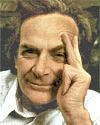 (source)
(source)
|
Richard P. Feynman
(11 May 1918 - 15 Feb 1988)
American theoretical physicist who was probably the most brilliant, influential, and iconoclastic figure in his field. His lifelong interest was in subatomic physics. In 1965, he shared the Nobel Prize in Physics for his work in quantum electrodynamics.
|
Richard P. Feynman Quotes on Physics (20 quotes)
>> Click for 116 Science Quotes by Richard P. Feynman
>> Click for Richard P. Feynman Quotes on | Atom | Discovery | Imagination | Knowledge | Law | Mystery | Nature | Problem | Science | Theory | Thinking | Universe |
>> Click for 116 Science Quotes by Richard P. Feynman
>> Click for Richard P. Feynman Quotes on | Atom | Discovery | Imagination | Knowledge | Law | Mystery | Nature | Problem | Science | Theory | Thinking | Universe |
~~[Need source]~~ All theoretical chemistry is really physics; and all theoretical chemists know it.
— Richard P. Feynman
Webmaster, so far, has been unable to find a primary source that adds the ending clause. (Can you help?) But Feynman certainly several times stated the idea in the opening clause. See, for example, the quote, “The theory of quantum mechanics … supplied the theory behind chemistry. So, fundamental theoretical chemistry is really physics.” on the Richard Feynman Quotes page on this website.
Astronomy is older than physics. In fact, it got physics started by showing the beautiful simplicity of the motion of the stars and planets, the understanding of which was the beginning of physics. But the most remarkable discovery in all of astronomy is that the stars are made of atoms of the same kind as those on the earth.
— Richard P. Feynman
In 'Astronomy', The Feynman Lectures on Physics (1961), Vol. 1, 3-6.
Every theoretical physicist who is any good knows six or seven different theoretical representations for exactly the same physics. He knows that they are all equivalent, and that nobody is ever going to be able to decide which one is right at that level, but he keeps them in his head, hoping that they will give him different ideas for guessing.
— Richard P. Feynman
In The Character of Physical Law (1965, 2001), 168.
Everything is made of atoms ... Everything that animals do, atoms do. ... There is nothing that living things do that cannot be understood from the point of view that they are made of atoms acting according to the laws of physics.
— Richard P. Feynman
In The Feynman Lectures (1963), 8.
I often use the analogy of a chess game: one can learn all the rules of chess, but one doesn’t know how to play well…. The present situation in physics is as if we know chess, but we don’t know one or two rules. But in this part of the board where things are in operation, those one or two rules are not operating much and we can get along pretty well without understanding those rules. That’s the way it is, I would say, regarding the phenomena of life, consciousness and so forth.
— Richard P. Feynman
In Superstrings: A Theory of Everything? by P. C. W. Davies and Julian Brown (1988).
I think equation guessing might be the best method to proceed to obtain the laws for the part of physics which is presently unknown.
— Richard P. Feynman
In his Nobel Prize Lecture (11 Dec 1965), 'The Development of the Space-Time View of Quantum Electrodynamics'. Collected in Stig Lundqvist, Nobel Lectures: Physics, 1963-1970 (1998), 177.
In its efforts to learn as much as possible about nature, modern physics has found that certain things can never be “known” with certainty. Much of our knowledge must always remain uncertain. The most we can know is in terms of probabilities.
— Richard P. Feynman
In The Feynman Lectures on Physics (1963), Vol. 1.
It always bothers me that according to the laws as we understand them today, it takes a computing machine an infinite number of logical operations to figure out what goes on in no matter how tiny a region of space and no matter how tiny a region of time … I have often made the hypothesis that ultimately physics will not require a mathematical statement, that in the end the machinery will be revealed and the laws will turn out to be simple, like the chequer board with all its apparent complexities. But this speculation is of the same nature as those other people make—“I like it”,“I don't like it”—and it is not good to be too prejudiced about these things.
— Richard P. Feynman
In The Character of Physical Law (1965, 2001), 57.
It is going to be necessary that everything that happens in a finite volume of space and time would have to be analyzable with a finite number of logical operations. The present theory of physics is not that way, apparently. It allows space to go down into infinitesimal distances, wavelengths to get infinitely great, terms to be summed in infinite order, and so forth; and therefore, if this proposition [that physics is computer-simulatable] is right, physical law is wrong.
— Richard P. Feynman
International Journal of Theoretical Physics (1982), 21 Nos. 6-7, 468. Quoted in Brian Rotman, Mathematics as Sign (2000), 82.
It is the facts that matter, not the proofs. Physics can progress without the proofs, but we can’t go on without the facts … if the facts are right, then the proofs are a matter of playing around with the algebra correctly.
— Richard P. Feynman
Feynman Lectures on Gravitation, edited by Brian Hatfield (2002), 137.
Mathematicians are only dealing with the structure of reasoning, and they do not really care what they are talking about. They do not even need to know what they are talking about … But the physicist has meaning to all his phrases. … In physics, you have to have an understanding of the connection of words with the real world.
— Richard P. Feynman
In The Character of Physical Law (1965), 55.
Nature uses only the longest threads to weave her patterns, so that each small piece of her fabric reveals the organization of the entire tapestry.
— Richard P. Feynman
In The Character of Physical Law (1965, 2001), 34.
One of the biggest and most important tools of theoretical physics is the wastebasket.
— Richard P. Feynman
In interview for the American Association for the Advancement of Science (AAAS), 'Richard Feynman Builds a Universe', collected in Jeffrey Robbins (ed.), The Pleasure of Finding Things Out (1999), Chap. 12, 234.
People say to me, “Are you looking for the ultimate laws of physics?” No, I’m not; I’m just looking to find out more about the world and if it turns out there is a simple ultimate law which explains everything, so be it; that would be very nice to discover. If it turns out it’s like an onion with millions of layers, and we’re just sick and tired of looking at the layers, then that’s the way it is …
— Richard P. Feynman
From Interview in BBC TV program Horizon (1981). As quoted in The Pleasure of Finding Things Out: The Best Short Works of Richard P. Feynman 1983, (1999), 23.
Philosophers have said that if the same circumstances don't always produce the same results, predictions are impossible and science will collapse. Here is a circumstance—identical photons are always coming down in the same direction to the piece of glass—that produces different results. We cannot predict whether a given photon will arrive at A or B. All we can predict is that out of 100 photons that come down, an average of 4 will be reflected by the front surface. Does this mean that physics, a science of great exactitude, has been reduced to calculating only the probability of an event, and not predicting exactly what will happen? Yes. That's a retreat, but that's the way it is: Nature permits us to calculate only probabilities. Yet science has not collapsed.
— Richard P. Feynman
QED: The Strange Theory of Light and Matter (1985), 19.
Physics is to mathematics what sex is to masturbation.
— Richard P. Feynman
In Fear of Physics by Lawrence M. Krauss (1993).
The theory of quantum mechanics also explained all kinds of details, such as why an oxygen atom combines with two hydrogen atoms to make water, and so on. Quantum mechanics thus supplied the theory behind chemistry. So, fundamental theoretical chemistry is really physics.
— Richard P. Feynman
In 'Introduction', QED: The Strange Theory of Light and Matter (1985), 5.
The whole question of imagination in science is often misunderstood by people in other disciplines. They try to test our imagination in the following way. They say, “Here is a picture of some people in a situation. What do you imagine will happen next?” When we say, “I can’t imagine,” they may think we have a weak imagination. They overlook the fact that whatever we are allowed to imagine in science must be consistent with everything else we know; that the electric fields and the waves we talk about are not just some happy thoughts which we are free to make as we wish, but ideas which must be consistent with all the laws of physics we know. We can’t allow ourselves to seriously imagine things which are obviously in contradiction to the laws of nature. And so our kind of imagination is quite a difficult game. One has to have the imagination to think of something that has never been seen before, never been heard of before. At the same time the thoughts are restricted in a strait jacket, so to speak, limited by the conditions that come from our knowledge of the way nature really is. The problem of creating something which is new, but which is consistent with everything which has been seen before, is one of extreme difficulty
— Richard P. Feynman
In The Feynman Lectures in Physics (1964), Vol. 2, Lecture 20, p.20-10 to p.20-11.
Turbulence is the most important unsolved problem of classical physics.
— Richard P. Feynman
In The Feynman Lectures on Physics (1964).
What I am going to tell you about is what we teach our physics students in the third or fourth year of graduate school… It is my task to convince you not to turn away because you don’t understand it. You see my physics students don’t understand it… That is because I don’t understand it. Nobody does.
— Richard P. Feynman
From Lecture, the first in the first series of Alix G. Mauntner Lectures, trascribed and editted by Ralph Leighton, 'Introduction', QED, The Strange Theory of Light and Matter (1985, 1988), 9.
See also:
- 11 May - short biography, births, deaths and events on date of Feynman's birth.
- Richard Feynman on The French Curve: a reflection on thinking inside the box.
- Genius: The Life and Science of Richard Feynman, by James Gleick. - book suggestion.
- Booklist for Richard Feynman.
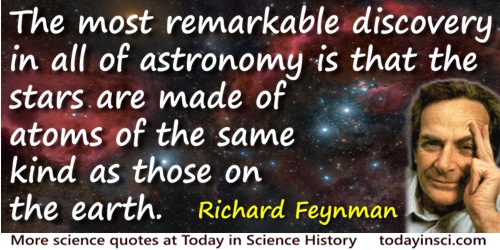
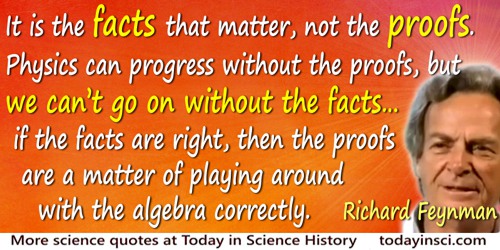
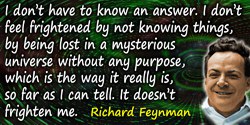
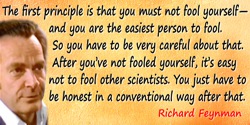

 In science it often happens that scientists say, 'You know that's a really good argument; my position is mistaken,' and then they would actually change their minds and you never hear that old view from them again. They really do it. It doesn't happen as often as it should, because scientists are human and change is sometimes painful. But it happens every day. I cannot recall the last time something like that happened in politics or religion.
(1987) --
In science it often happens that scientists say, 'You know that's a really good argument; my position is mistaken,' and then they would actually change their minds and you never hear that old view from them again. They really do it. It doesn't happen as often as it should, because scientists are human and change is sometimes painful. But it happens every day. I cannot recall the last time something like that happened in politics or religion.
(1987) -- 


